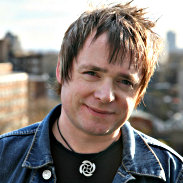 Two weeks into our great adventure, it’s time to bring you all out there in blogland up to date.
Two weeks into our great adventure, it’s time to bring you all out there in blogland up to date.
Maybe you don’t know what I’m talking about. So I’ll tell you.
On Sunday, 22nd November, 2009, the tiny congregation meeting in the parish church building in the Church of England parish of St Luke, Southsea, said goodbye to that building. In a special service, we moved around the building, stopping at various points — the main entrance, the font, etc. At each ‘station’ we marked some feature or character of the church’s life, symbolised by the piece of church furniture at which we were stopping. We committed ourselves to carry that aspect of our common life forward into our new future.
Why did we do that? Because from then on, we would be ceasing to hold our 11 a.m. Sunday service in the church building. Instead, we have since been gathering in the community room attached to one of the nearby tower blocks. But it’s not just a matter of geography. We haven’t moved our Sunday service of Anglican liturgical worship. We’ve ended it.
The time for the intentionally Christian community’s worship is now on a Tuesday evening as part of our home group. Each week we share a meal, a Eucharist and prayer and engagement with the Bible in my home.
 On Sundays, now, between 10 a.m. and midday, we open what we’re calling the Sunday Sanctuary.
On Sundays, now, between 10 a.m. and midday, we open what we’re calling the Sunday Sanctuary.
We provide breakfast and refreshments all morning and some sort of craft-based activity. Alongside that, there’s one or two light, reflective activities on offer. We’ve been describing it as a family drop-in in the publicity material. Is that what it’s been?
In the first week, six people we hadn’t met before came: a brother and sister, a child who came with one of our members who lives in the block, and three young teenage boys. So all of our guests were children, without their parents. This isn’t what we were aiming for but it is, to a degree, what we expected. We have tried to avoid becoming a child-minding service by insisting that children below secondary school age should be accompanied by a parent, another adult or an older sibling.
In the second week, we had nine guests, three of whom we had seen the week before. The brother and sister returned and brought their younger brother with them. One of the teenage boys from last week returned and brought a friend with him. One of our members who lives in the block brought a different child with them this week and in the second half of the morning a mum and her two children joined us. I hope, dear reader, you can understand that when I say that we were encouraged by the presence of this family (at our family drop-in) it doesn’t reflect any sense of disappointment with, or devaluing of, our other guests. We have been encouraged and pleased to meet, serve and share with all those we’ve met. But meeting this family this week has suggested that our ‘model’ might just work; it might be the right one.
 Already, we have experienced a steep learning curve. I anticipate that our Tuesday night gatherings will include some lively conversations from now on. The first surprise was that people are staying all morning. In fact this week, we had a job on our hands dissuading two people from coming in before we opened at 10. That job lasted for nearly 50 minutes. We had been working on the assumption that people might come for 30 or 45 minutes and then go. One or two craft activities can sustain that but not if people are there for 2 hours. So we are rapidly having to think about creating a broader range of things for people to do. This requires more work from us, which presents its own challenge for a community where there is not an evenness of either commitment or capacity.
Already, we have experienced a steep learning curve. I anticipate that our Tuesday night gatherings will include some lively conversations from now on. The first surprise was that people are staying all morning. In fact this week, we had a job on our hands dissuading two people from coming in before we opened at 10. That job lasted for nearly 50 minutes. We had been working on the assumption that people might come for 30 or 45 minutes and then go. One or two craft activities can sustain that but not if people are there for 2 hours. So we are rapidly having to think about creating a broader range of things for people to do. This requires more work from us, which presents its own challenge for a community where there is not an evenness of either commitment or capacity.
Some of those we’re engaging with have somewhat chaotic lives. Just being able to provide some decent nutrition and some positive adult contact and attention is more, I suspect than some are regularly getting. That all presents its own challenges, as I’m sure you can imagine.
There are so many sensitivities here that it’s difficult to say too much more. It might sound as if all these reflections are practical, rather than spiritual. But at the forefront of our minds is the need to ensure that all we do is intentionally spiritual. It would be easy in lots of ways to respond to our challenges by resorting to entertainment. Just (as we’re frequently asked) to get the pool table and other games out. But we aren’t a youth club or a kids’ club. We’re a church operating a family drop in. We’re not about forcing anything on anyone. Everything is optional. But everything we offer comes from who we are.
 That’s the unique contribution we bring: ourselves and our faith. That’s not an imposition, I believe, it’s a positive gift. It motivates us to love each and every person and to believe in everyone we meet. Other people find different motivations and end up in the same place. But this is our motivation. So faith has a positive contribution to make to the extent that it provokes us as a community to draw alongside people living in this difficult locality.
That’s the unique contribution we bring: ourselves and our faith. That’s not an imposition, I believe, it’s a positive gift. It motivates us to love each and every person and to believe in everyone we meet. Other people find different motivations and end up in the same place. But this is our motivation. So faith has a positive contribution to make to the extent that it provokes us as a community to draw alongside people living in this difficult locality.
But I’m also excited about the positive contribution that finding faith can make for each person we meet. Faith brings positive transformation. What I’m trying to say is that if people discover faith for themselves through this, that is an outcome I would celebrate. (I think it’s at least as likely that those of us who consider ourselves to have faith already will rediscover faith.)
The difference between what we’re doing here and a regular church service is that we’re not expecting people to come to us and do what we do without space for question or doubt or just exploration in conversation. The activities we offer share some of the things that we have found meaningful. They invite others to imaginatively enter into that world of meaning — to ‘try it on for size’. But we will always respect people’s freedom and if people find themselves taking a different point of view, it will not affect our welcome of them.
 So enough of me and my angst (for now 😉 ). This week the PCC meet to kick of the process of reviewing where we’ve got to with what we’re currently doing and how we might develop. The discussion will be in two parts. The first part takes us through the values of a mission-shaped church, as we have been paraphrasing them. The second is about trying to determine what options there are for taking things forward.
So enough of me and my angst (for now 😉 ). This week the PCC meet to kick of the process of reviewing where we’ve got to with what we’re currently doing and how we might develop. The discussion will be in two parts. The first part takes us through the values of a mission-shaped church, as we have been paraphrasing them. The second is about trying to determine what options there are for taking things forward.




 One reader posted a question today as a comment on the previous post, asking if it is ‘all quiet on the Western Front’. It has always been a feature of blogs that bloggers write a lot of posts apologising for not writing posts. I’m no exception. It has been quiet on this blog and I do worry that I will be annoying or alienating those people who take the time and trouble to read it. Sorry. I had a really interesting comment from ‘Ferry’ in questions of power and identity to which I’m still formulating a response.
One reader posted a question today as a comment on the previous post, asking if it is ‘all quiet on the Western Front’. It has always been a feature of blogs that bloggers write a lot of posts apologising for not writing posts. I’m no exception. It has been quiet on this blog and I do worry that I will be annoying or alienating those people who take the time and trouble to read it. Sorry. I had a really interesting comment from ‘Ferry’ in questions of power and identity to which I’m still formulating a response. Mark Berry speaks passionately about the values of the ‘Safespace’ community in Telford– hospitality and mission, diversity and inclusion, openness and commitment. Those are my words for what I heard Mark articulating in several different conversations — with me, with an American journalist, and with the community itself.
Mark Berry speaks passionately about the values of the ‘Safespace’ community in Telford– hospitality and mission, diversity and inclusion, openness and commitment. Those are my words for what I heard Mark articulating in several different conversations — with me, with an American journalist, and with the community itself.
Recent Comments